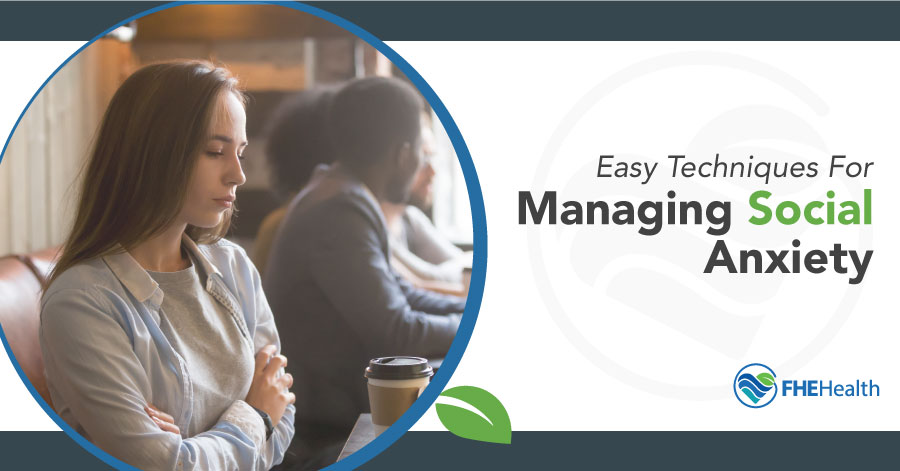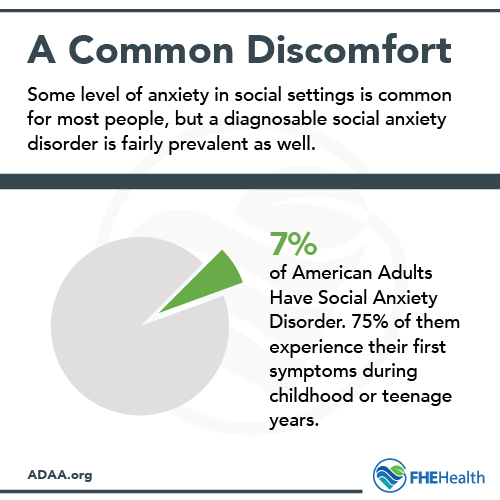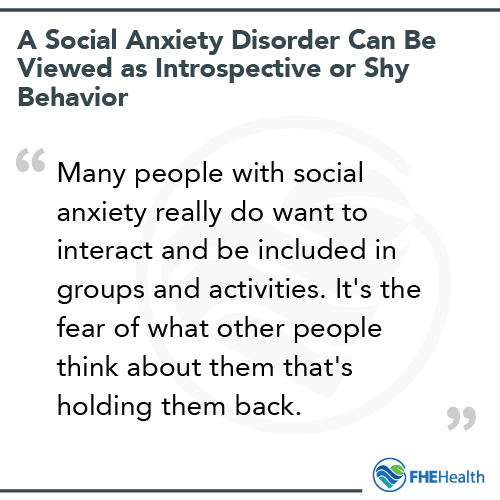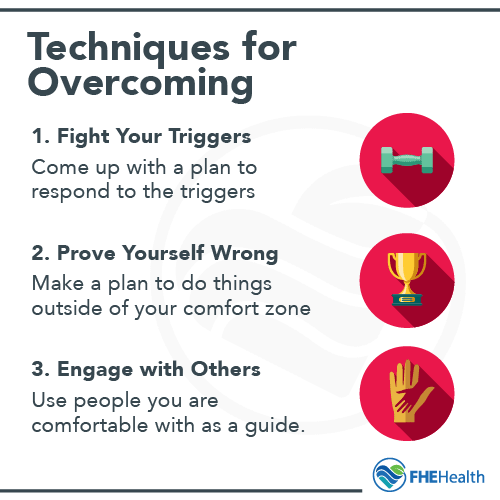
You’re living your life, dealing with all that you have to, but you find that you’re always at home alone. Every time you try to head out, you get anxious and nervous. Why does this happen? You wonder, “Does everyone get social anxiety?”
For some people, having an addiction can be a component of developing social anxiety. You think about the last times you’ve socialized with friends and family.
Every time you look back, you remember enjoying drinks with friends, hanging out at a local club or spending time at a friend’s home, always with a drink in hand. How can you embrace life again when you are facing recovery and relapse risk?
For others, social anxiety has nothing to do with addiction. It’s all about the way you perceive yourself in a group of people.
Perhaps it’s Saturday night right now. You long to have someone to talk to and just relax with, but instead, you’re stuck at home, facing a long night of Netflix. Is this the way it has to be?
Social Anxiety: A Real Problem for Most People
Most people don’t have unlimited confidence and face social anxiety in day-to-day situations. Perhaps you feel like you’re missing out on opportunities to spend time with friends and family that you love if you just stay home.
Yet, those same opportunities worry you. You think about what you’ll say and whether people will think you’re weird for some reason. It’s often easier to stay at home.
If this sounds like you, it’s time to take a closer look at what it means to have social anxiety and how overcoming social anxiety can improve your quality of life.
Is Social Anxiety Curable?

Social anxiety makes you feel anxious, worried and even afraid to interact with other people. You may believe that other people will think negatively of you for any number of reasons. You worry about being evaluated by others.
The condition is pervasive, and it will worsen over time if you don’t act on it. But it is treatable.
Most people experience anxiety in some form, including in social situations. For example, some people feel it’s difficult to speak in front of a group. Others don’t like situations where there is just one other person because they feel the need to say something valuable to keep the conversation going.
Understanding Perception
One of the keys to overcoming social anxiety is getting a real understanding of what’s happening around you. What you perceive is probably not what’s happening. But you may be too worried and afraid to investigate.
Many people view those with social anxiety as just shy or withdrawn. Others think you’re unfriendly or feel you’re too good for them. However, this is often far from the truth.
Many people with social anxiety really do want to interact and be included in groups and activities. It’s the fear of what other people think about them that’s holding them back.
At What Point Should You Seek Help?
 Although most people experience social anxiety from time to time, for others, it can worsen into a serious limitation on their overall health and well-being. The problem tends to grow, worsening each time they don’t put themselves in these challenging circumstances.
Although most people experience social anxiety from time to time, for others, it can worsen into a serious limitation on their overall health and well-being. The problem tends to grow, worsening each time they don’t put themselves in these challenging circumstances.
Here’s an example. You may feel as though a group of people will talk about you if you say something awkward, so you avoid them.
Every time you see them, your anxiety increases. Your mind races with thoughts about whether they know you’re avoiding them and what they could be saying. Over time, you stop going to locations and participating in activities you enjoy because of this fear.
When anxiety reaches the level where it impacts the quality of your life or leads to the inability to function as you would like, it’s time to seek help. Working with a therapist and counselor, you can talk about what’s happening and work toward overcoming the problem.
What Are Your Goals for Your Anxiety?
Before you begin dealing with social anxiety, determine your goals. Think big here.
- Do you want to go somewhere specific where there are large groups of people and have fun?
- Do you want to have a few good friends to talk to?
- If you have an addiction, do you want to feel at ease and not be judged for it?
- Perhaps you want to get up on stage and sing.
- You may want to have the confidence to share your opinions in a large group.
Define several goals you would like to accomplish. If you didn’t have social anxiety, what would you do?
Techniques for Dealing With Social Anxiety
 Although it’s difficult, both easier and recommended to seek help, it is possible to self-treat social anxiety with a few methods.
Although it’s difficult, both easier and recommended to seek help, it is possible to self-treat social anxiety with a few methods.
1. Fight Your Triggers
Social anxiety triggers are common. They include things like being teased or getting embarrassed easily.
Other times, it’s specific locations. Try this technique.
When you feel the rush of anxiety coming on, laugh. Make a joke to someone near you.
Make yourself feel embarrassment and awkwardness right away. Once that’s out of the way, you can focus on what’s happening around you.
2. Prove Yourself Wrong
Let’s say you never look up when you’re in a group because you feel like everyone is watching you. Force yourself to look up and make occasional eye-contact.
Is anyone actually looking at you? Probably not. Challenge any of your beliefs, and prove yourself wrong.
3. Engage with Others
You may have a friend or family member you feel at ease with most of the time. Go with them to a location where you feel completely out of place. Ask this person to guide you through what’s really happening and help you make conversation.
How Can You Tell if It’s Getting Better?
It’s not easy to know if social anxiety is improving because you’ll likely feel the same pressure for a long time. The difference is your willingness to keep going.
With every outing, you’ll gain more confidence and, hopefully, enjoy yourself. That helps you to build on these experiences.
Do You Need Help for Social Anxiety?
If you’re suffering from social anxiety or other forms of anxiety, it may be time to seek professional help. Contact our counselors at FHE Health to talk about techniques that can work for you. Call us at (833) 596-3502 to learn how we can help.






